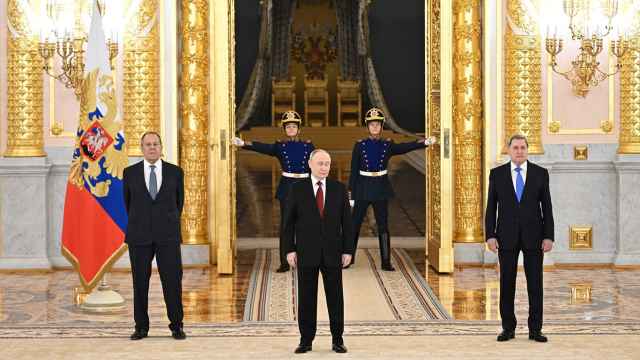Russia's two metal giants have emerged as big winners from Indonesia's new mining law, after leading a drive to get Jakarta to stick to its controversial mineral ore export ban in the face of opposition from miners and Asian buyers.
In its six-month lobbying campaign last year, United Company RusAl and Norilsk Nickel delivered a blunt message to Indonesian officials: We will only invest billions of dollars in smelters if you ban bauxite and nickel ore exports.
The effort seemed to have paid off, despite a denial by Indonesia that it was influenced. When the law came into effect this year, Indonesia enforced a water-tight export ban for only two major minerals — nickel ore and bauxite.
The halting of $3 billion of annual nickel ore and bauxite exports has already lifted the price of nickel and helped support aluminum, boosting the fortunes of RusAl and Norilsk, the world's top aluminum and nickel producers, respectively.
At the same time, it has strengthened the case for the pair to invest billions of dollars in Indonesia to build smelters to replace costly capacity in Russia, a key part of a recovery plan for struggling RusAl and in line with Indonesia's own aims to earn more from its minerals resources.
The mineral ore export ban is aimed at forcing miners to move up the value chain by processing the minerals they dig up.
RusAl CEO Oleg Deripaska traveled repeatedly to Jakarta last year as signs emerged that the government might water down the ban under pressure from miners, and concerns over its impact on Southeast Asia's largest economy.
"They made the export ban policy the main requirement for them to invest here," Industry Minister Mohamad Hidayat told Reuters.
Just before the ban took effect on Jan. 12, Indonesia conceded to pressure from miners and made last-minute changes to the policy to allow shipments of most metals to go on, but it did not relax the policy for nickel ore and bauxite.
The supply cuts have already been a game changer for nickel, with benchmark nickel prices soaring 17 percent to an 11-month high after the ban, while starving global markets of bauxite that should help curb China's huge aluminum expansion and support global prices.
This has benefited RusAl and Norilsk, whose shares have risen more than 11 percent since the ban, though it has been at the expense of big buyers such as China and Japan.
"Behind all of this is RusAl," said Tjandra Irawan, director of Indonesia's Mineral Entrepreneurs Association. "What RusAl always wanted was a total ban … only then would they invest."
Indonesia's industry minister denied overseas firms played a role in how the ban was implemented. Foreign influence on such a big economic policy is sensitive in Indonesia, particularly with elections looming in a few months.
When asked about its lobbying strategy, RusAl said it was "closely following the developments" in the months leading up to the ban because of the uncertainty over how the government would implement the law. Norilsk declined to comment.
Second Thoughts
Around the middle of last year, Indonesia began wavering on the proposal due to fears a complete ore export ban would hurt the economy and lead to widespread unemployment.
Government officials sought to reassure the mining sector that the law would be diluted.
This worried RusAl, which has been struggling with weak aluminum prices and mounting debt and saw the export ban as key to its turnaround strategy, which included making Indonesia a regional hub for its alumina production.
Russian Investment
From June last year, RusAl's CEO went to Indonesia at least three times in six months to push the government over the issue.
The Russian firms also teamed up with UBS and the Indonesian Chamber of Commerce and Industry to hold a seminar in Jakarta in October attended by top government officials.
The firms were especially worried about a proposal from the mines ministry that could allow exports of unprocessed mineral ore to continue for companies planning to build smelters.
The ministry dropped the proposal a month later after it was rejected by parliament, though sought industry input on how to implement the mining law without damaging the entire sector.
While U.S., Japanese, and Chinese firms have long been big investors in resource-rich Indonesia, Russian firms are now pledging to significantly lift their investment.
RusAl's Deripaska came with a big Russian business delegation to Jakarta in February to sign a memorandum of understanding to build an alumina smelter in West Kalimantan for an estimated $3 billion. Russian Railways is also planning to invest $2 billion in a coal rail line to East Kalimantan.
A Message from The Moscow Times:
Dear readers,
We are facing unprecedented challenges. Russia's Prosecutor General's Office has designated The Moscow Times as an "undesirable" organization, criminalizing our work and putting our staff at risk of prosecution. This follows our earlier unjust labeling as a "foreign agent."
These actions are direct attempts to silence independent journalism in Russia. The authorities claim our work "discredits the decisions of the Russian leadership." We see things differently: we strive to provide accurate, unbiased reporting on Russia.
We, the journalists of The Moscow Times, refuse to be silenced. But to continue our work, we need your help.
Your support, no matter how small, makes a world of difference. If you can, please support us monthly starting from just $2. It's quick to set up, and every contribution makes a significant impact.
By supporting The Moscow Times, you're defending open, independent journalism in the face of repression. Thank you for standing with us.
Remind me later.





